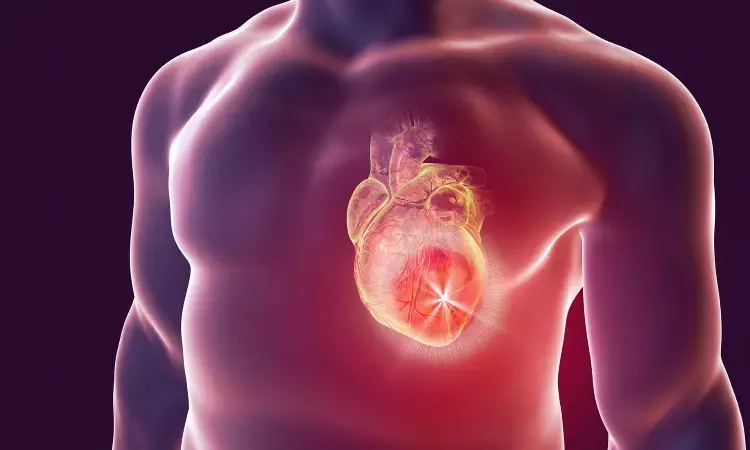- Home
- Medical news & Guidelines
- Anesthesiology
- Cardiology and CTVS
- Critical Care
- Dentistry
- Dermatology
- Diabetes and Endocrinology
- ENT
- Gastroenterology
- Medicine
- Nephrology
- Neurology
- Obstretics-Gynaecology
- Oncology
- Ophthalmology
- Orthopaedics
- Pediatrics-Neonatology
- Psychiatry
- Pulmonology
- Radiology
- Surgery
- Urology
- Laboratory Medicine
- Diet
- Nursing
- Paramedical
- Physiotherapy
- Health news
- Fact Check
- Bone Health Fact Check
- Brain Health Fact Check
- Cancer Related Fact Check
- Child Care Fact Check
- Dental and oral health fact check
- Diabetes and metabolic health fact check
- Diet and Nutrition Fact Check
- Eye and ENT Care Fact Check
- Fitness fact check
- Gut health fact check
- Heart health fact check
- Kidney health fact check
- Medical education fact check
- Men's health fact check
- Respiratory fact check
- Skin and hair care fact check
- Vaccine and Immunization fact check
- Women's health fact check
- AYUSH
- State News
- Andaman and Nicobar Islands
- Andhra Pradesh
- Arunachal Pradesh
- Assam
- Bihar
- Chandigarh
- Chattisgarh
- Dadra and Nagar Haveli
- Daman and Diu
- Delhi
- Goa
- Gujarat
- Haryana
- Himachal Pradesh
- Jammu & Kashmir
- Jharkhand
- Karnataka
- Kerala
- Ladakh
- Lakshadweep
- Madhya Pradesh
- Maharashtra
- Manipur
- Meghalaya
- Mizoram
- Nagaland
- Odisha
- Puducherry
- Punjab
- Rajasthan
- Sikkim
- Tamil Nadu
- Telangana
- Tripura
- Uttar Pradesh
- Uttrakhand
- West Bengal
- Medical Education
- Industry
Reduction of CV events by PCSK9 inhibitors and ezetimibe: Clinical practice guideline

Additional cholesterol lowering drugs should be offered to patients with high levels of 'bad' (LDL) cholesterol (70 mg/dl or higher) who are also at high risk of heart disease, say a panel of international experts and patients in The BMJ today.
The drugs assessed by the panel are ezetimibe and PCSK9 inhibitors. They work by reducing the absorption of cholesterol from foods and the production of cholesterol in the body.
The recommendations apply to adults already taking the maximum dose of statins or those who are intolerant to statins and are part of The BMJ's 'Rapid Recommendations' initiative - to produce rapid and trustworthy guidance based on new evidence to help doctors make better decisions with their patients.
The panel considered the balance of benefits against the burdens and potential harms of starting a new drug according to patients' level of risk, values and preferences, and their advice represents a shift from the traditional focus on lowering cholesterol levels to a focus on reducing an individual's overall cardiovascular risk.
New evidence from 14 trials involving 83,660 patients shows that ezetimibe and PCSK9 inhibitors probably reduce heart attacks and strokes in patients with very high and high cardiovascular risk, but not in patients with moderate and low cardiovascular risk.
These relative benefits were consistent, but their absolute magnitude varied based on cardiovascular risk in individual patients (for example, for 1000 people treated with PCSK9 inhibitors in addition to statins over five years, benefits ranged from 2 fewer strokes in the lowest risk to 21 fewer in the highest risk).
The guideline panel provided mostly weak recommendations, which means that researchers rely on shared decision making when applying these recommendations.
A) For adults already using statins, the panel suggests adding a second lipid-lowering drug in people at very high and high cardiovascular risk but recommends against adding it in people at low cardiovascular risk.
B) For adults who are intolerant to statins, the panel recommends using a lipid-lowering drug in people at very high and high cardiovascular risk but against adding it in those at low cardiovascular risk.
C) When choosing to add another lipid-lowering drug, the panel suggests ezetimibe in preference to PCSK9 inhibitors.
D) The panel suggests further adding a PCSK9 inhibitor to ezetimibe for adults already taking statins at very high risk and those at very high and high risk who are intolerant to statins.
E) No important side events were found, although PCSK9 inhibitors require injections that sometimes result in injection site reactions, which the experts say is a burden and harm that may matter to patients.PCSK9 inhibitors are also more expensive than ezetimibe and statins.
F) As such, the panel favours ezetimibe over PCSK9 inhibitors, but says "both would provide important benefits for adults in the high and very high risk group, but would be of little benefit for adults in the low risk group."
The panel acknowledges some uncertainties in the evidence underlying this guideline and notes that clinicians need to identify patients' individual cardiovascular risks to apply these risk-stratified recommendations.
Reference;
PCSK9 inhibitors and ezetimibe for the reduction of cardiovascular events: a clinical practice guideline with risk-stratified recommendations BMJ 2022; 377 doi: https://doi.org/10.1136/bmj-2021-069066 (Published 04 May 2022) Cite this as: BMJ 2022;377:e069066
Dr Kamal Kant Kohli-MBBS, DTCD- a chest specialist with more than 30 years of practice and a flair for writing clinical articles, Dr Kamal Kant Kohli joined Medical Dialogues as a Chief Editor of Medical News. Besides writing articles, as an editor, he proofreads and verifies all the medical content published on Medical Dialogues including those coming from journals, studies,medical conferences,guidelines etc. Email: drkohli@medicaldialogues.in. Contact no. 011-43720751


